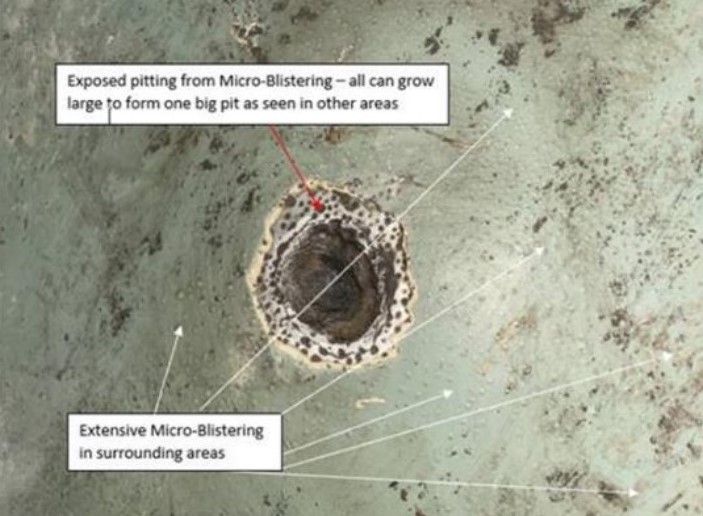Lloyd’s Register (LR) informs that certain ship’s tanks could be subjected to severe microbial attack, causing significant losses in plating thickness.
According to LR, this is a result of biological action where the fluid in the tank has been stagnant during an enforced period of reduced operational status. Tanks likely to be affected are those that may have higher biological loads, such as Grey Water and Treated Black water. Also vulnerable are Distillate (MGO) Tanks, which, if not used, could exhibit this phenomenon due to the presence of condensation.
[smlsubform prepend=”GET THE SAFETY4SEA IN YOUR INBOX!” showname=false emailtxt=”” emailholder=”Enter your email address” showsubmit=true submittxt=”Submit” jsthanks=false thankyou=”Thank you for subscribing to our mailing list”]
#1 Onboard investigation
Ship operators should investigate any tanks that meet the above criteria and have had a prolonged period of non-use during a period of reduced operational status. It is recommended that class-related tank inspection due dates are advanced in their survey schedule. Associated piping systems should also be monitored as far as practicable for possible diminution or leakage.
As an example of the possible effect of this phenomenon, a tank with several affected areas had 14mm microbial pitting in a 17mm-thick bottom plate. Where sampling of fuel oil tanks show evidence of water ingress due to condensation, shipowners are encouraged to investigate the tank conditions and act appropriately.

#2 Ensure pre-checks and testing
When dry-dockings are being planned, it is recommended that shipowners investigate likely tanks to ensure any steelwork repairs can take place in the docking period. As an initial step, testing kits are available to identify contamination in tanks with elevated risk. Further investigation could include laboratory tests.
All cases will be assessed on a case-by-case basis with solutions ranging from steelwork renewals to chemical treatments. Advance planning will benefit shipowners, avoiding unscheduled dry dockings or cancellations. The microbial attack depends upon many factors, including bacteria present, temperature, time, tank agitation and suitable nutrient supply along with the overall tank environment, such as coating condition.
Should chemical treatments be considered, the subsequent MARPOL consequences of tank cleaning should be carefully considered.
#3 Report problems immediately
Adequate time must be arranged to enable repairs and avoid the likelihood of any hull failure or pollution incident.






























































